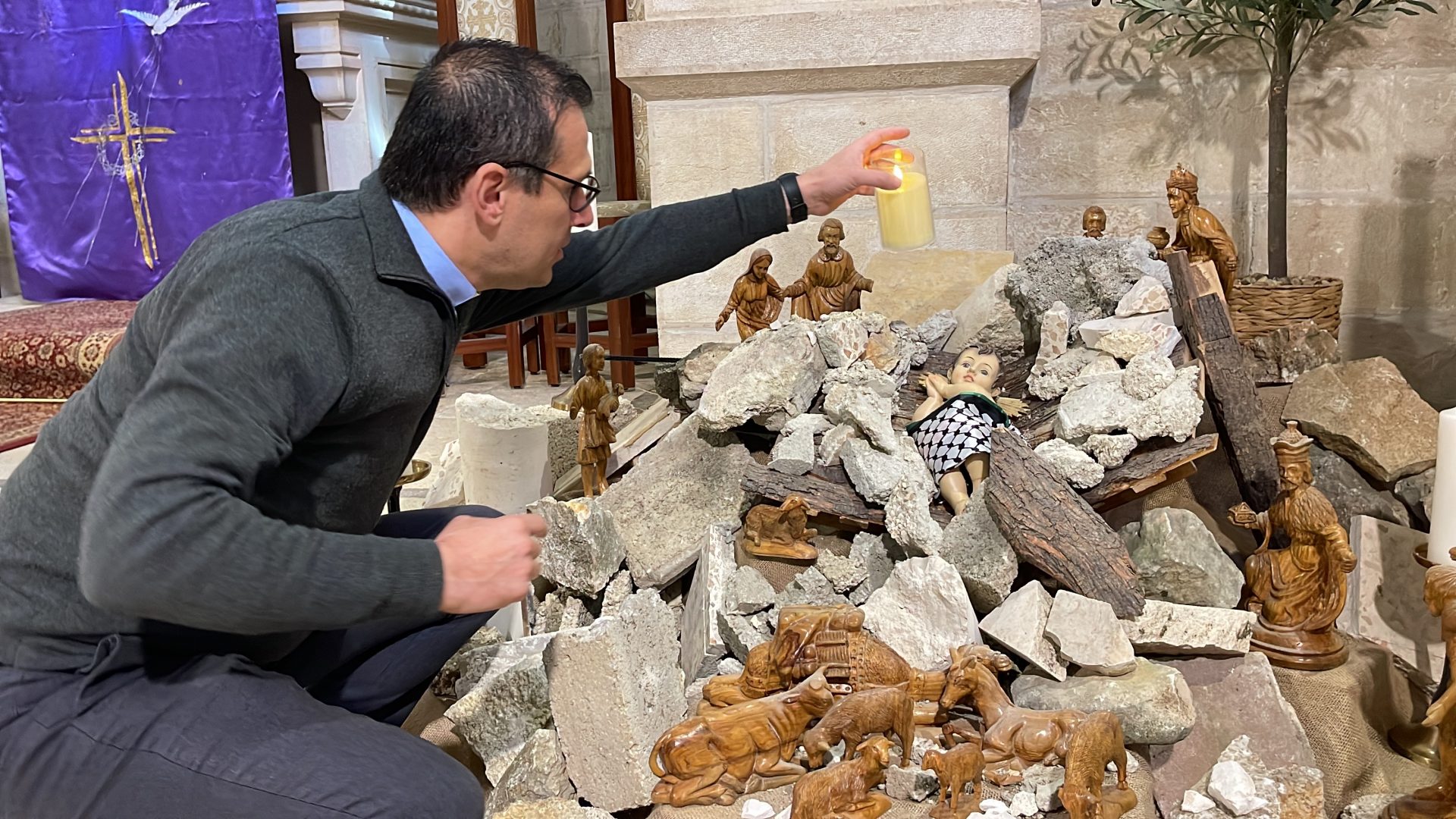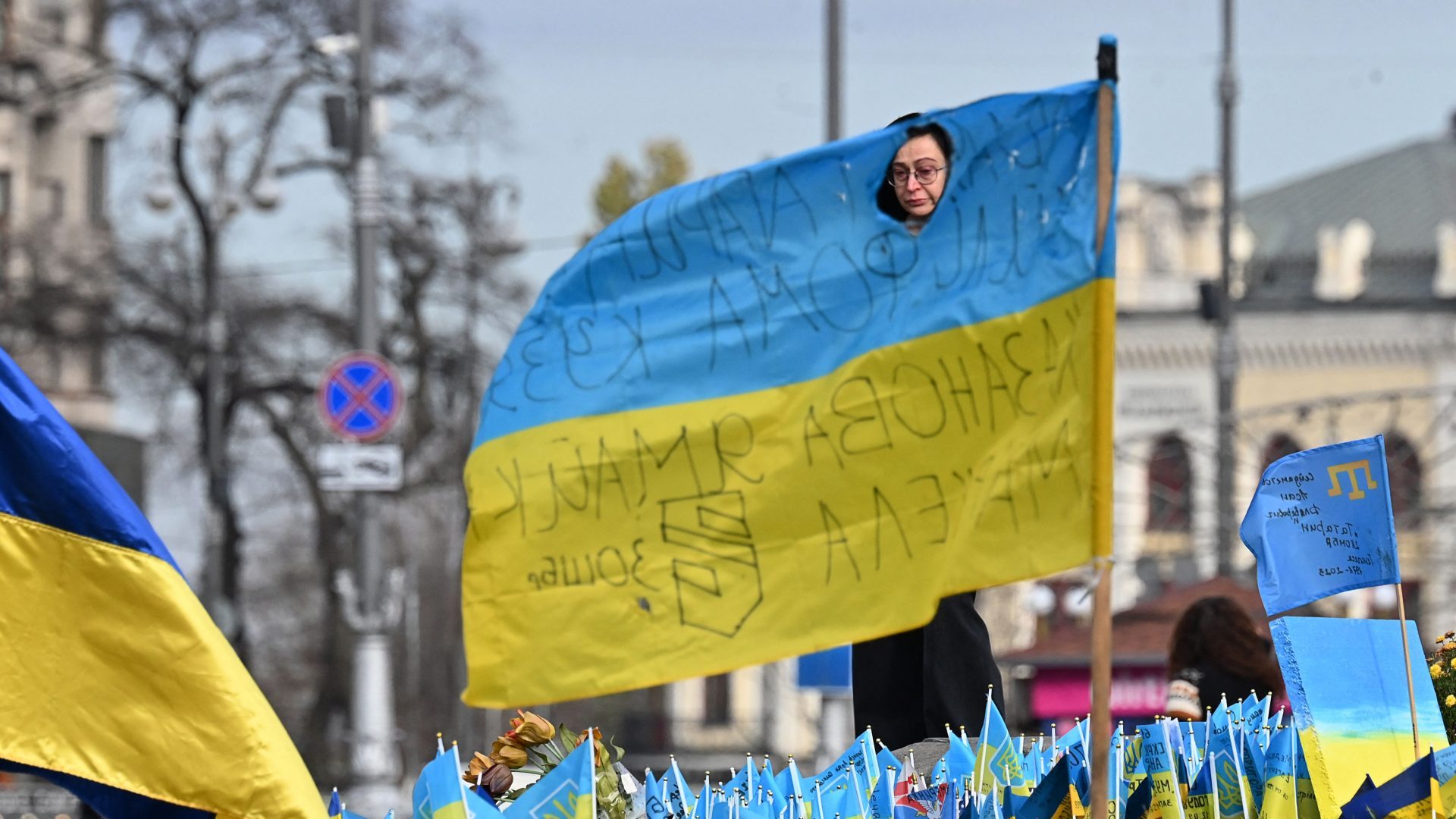You don’t have to look far in the 125-year old Evangelical Lutheran Christmas church in Bethlehem to see how its Palestinian pastor, Munther Isaac, envisages December 25, 2023. Where there would normally be a candle-lit nativity crib, the candles will now illuminate only a figure of the baby Jesus, swaddled in a Palestinian keffiyeh and surrounded by rubble.
It will be, says Isaac, a sad Christmas. The leaders of all the Christian churches in Jerusalem and the West Bank – let alone in Gaza where the churches are now serving as makeshift refuges for many hundreds of the 1.8 million Palestinians displaced by war – have all agreed there will be none of the usual celebrations. Isaac explains that for the first year anyone can remember there will be no Christmas trees, twinkling lights in the streets and churches, none of the scout parades, or marching bagpipe and drum bands. “Usually, there are many concerts. Usually there are stalls in the streets, giving gifts to children. None of that is happening. Instead, we’re focusing on prayer. And we’re praying for Gaza.”
We have met in the sister Lutheran church, where he is also the pastor, in Isaac’s West Bank home town of Beit Sahour, adjacent to Bethlehem and also the site of Shepherd’s Field, where by tradition the angels announced to the shepherds that Jesus had been born. And sure enough, where the church would normally also be festooned with seasonal decoration, its only adornment this sunny December Saturday morning is the black, green, white and red Palestinian national flag, fluttering in the breeze above the roof.
Since October 7, when Hamas inflicted its atrocities on Israeli civilians along the Gaza border, Israeli security closures have further complicated Palestinian life in this occupied territory. Even the normally simple journey here from Jerusalem required a tortuous route through the village of Al Khadr, the Dheisheh refugee camp and Bethlehem itself. More significantly, hundreds of Palestinians no longer crowd the approach to checkpoint No. 300 between Bethlehem and Jerusalem from way before dawn, as permission to work in Jerusalem is withheld. Isaac explained that part of the church’s current mission was to help families stricken by the new wave of unemployment with food packages and financial support.
But it’s grief at the wholesale death and destruction in Gaza that lies behind the bleak nativity scene he installed in his church at the beginning of Advent. “We did that because we continue to see images of children under the rubble day after day after day. And we’re troubled by them, we’re broken by them, and we feel powerless. We feel sad because of the silence of the world as well, and the complicity of the world. We feel that our lives don’t matter, are not worth the same as those of others.”
Isaac, who is also a theologian and Academic Dean of the Bethlehem Bible College, said the message of Christmas was that “Jesus is born among the marginalised. And so I’ve been saying that if Jesus were to be born today, he would be born and raised in Gaza under the rubble. We also wanted to send a message to the world from the Christmas church, that in a time when the world is celebrating the birth of Jesus in different ways, usually in festive lights and Christmas trees, this is what Christmas looks like in Palestine, the birthplace of Christmas. Namely, children being killed. Homes destroyed and families displaced. And this is the message from the manger.”
We met the day after the US vetoed a UN Security Council resolution calling for a ceasefire. France supported the vote. Britain abstained. “And they claim to care for Palestinian children,” says Isaac. “But they’re sending the weapons to be used against us. The governments of the US and the UK are directly complicit in this genocide. They’re partners… This is how we see it as Christians here. And I want to remind you that nine Palestinian Christian children have been killed in this war.”
This is a reference to the nine children (of the well over 6,000 Gazan children already reported to have been killed) among the 18 people killed on October 19 in the Greek Orthodox church of St Porphyrius in the Zeitoun district of Gaza City. This followed a bombardment of the building next door, which the Israeli military said had been used as a command centre for the launch of rockets and mortars.
But didn’t Israeli civilians also lose children – 36 killed during Hamas’s massacre of 1,200 on October 7? “We are sad for any child who was killed in this war,” replies Isaac without hesitation. But he adds: “It doesn’t look like our children’s lives matter in the same way. When the Israeli children were killed, the Eiffel Tower… showed the Israeli flag; 6,000 [dead] Palestinian children later, we’re still waiting for sympathy. So when I put baby Jesus in a keffiyeh, there is a message because these Palestinian children have been dehumanised for too long.”
Jerusalem’s Latin Patriarch, Cardinal Pierbattista Pizzaballa, who is responsible for the Roman Catholic church in the Holy Land, may not usually be quite so politically outspoken as Pastor Isaac, but he authorised the bluntest of statements saying that two female parishioners, Nahida Khalil Anton and her daughter, Samar Kamal Anton, had been shot dead by an Israeli sniper as they waked to a nearby convent from the Catholic Holy Family church in Gaza. “They were shot in cold blood inside the premises of the parish,” it added, “where there are no belligerents.”
He received powerful support from Pope Francis, who declared: “Some say it is war, it is terrorism. Yes, it is war. It is terrorism. That is why the Scripture affirms that ‘God stops wars… breaks the bow, splinters the spear’. Let us pray to the Lord for peace.”
Like the Pope, the Patriarch had repeatedly called for a ceasefire (and at a press conference in Rome in October even offered himself up as a hostage to replace the 240 taken by Hamas) For he is even more directly involved in Gaza than the Lutherans because 200 of the 1,000 Christians in Gaza are Catholics. The rest are Greek Orthodox, who celebrate their Christmas on January 7. And around 700 of both denominations – including relatives of Layla Moran, the senior British Liberal Democrat MP – are still taking shelter in the precincts of the Catholic Holy Family church after the attack on St Porphyrius, including 200 within the church itself. “The buildings around it were bombed, but the church is still standing,” explained Father Ibrahim Nino of the Latin Patriarchate. “The ones sleeping in the church clear up each morning to get ready for mass.”
While the patriarch expects as usual to pass through checkpoint 300 on his way to midnight mass in Bethlehem on December 24, there will be none of the seasonal noise and colour attending such processions. “We have asked people to refrain from the usual celebrations outside the churches at Christmas and to focus on the reason and spirit of Christmas,” Father Nino explained. “We want all people to pray for peace, especially in Gaza.”
The patriarchate has maintained contact with the stricken congregation in Gaza whenever it can, but as Father Nino said, “communications have been difficult because of the lack of power. One of the church’s solar panels was damaged and they are having to use petrol” (ie generator). “They are having to limit their use of electricity.”
Father Gabriel Romanelli, the Arabic-speaking Argentinian parish priest in Gaza, was in Bethlehem buying medicine when Hamas struck on October 7. He has been unable to return since. The Palestinian Father Yusuf is still in place, looking after their flock. In normal years Christmas has been particularly special for Gaza. It is a time to pray for peace during the sung mass and to forget the travails inflicted by 16 years of life under a blockade. Father Gabriel likes to point out that after the visit of the Magi, the Holy Family passed through Gaza on their flight to Egypt to escape Herod’s massacre of the innocents, a story related in St Matthew’s Gospel.
While Gaza’s ancient but much dwindled Christian community is well under 1% of the population, it has long punched above its weight. The churches’ three schools served mostly Muslim pupils, and true to form have now been providing shelter to thousands of displaced Muslims. The Catholic Sisters of Mother Theresa have cared for seriously disabled people, 54 of whom were also displaced on Saturday, the Patriarchate said, when the convent housing them was struck by Israeli missiles. The Patriarchate said the building had been clearly signalled as a church site. Rosary Sisters have also provided the sole care for some of the most severely disabled children from across the Gaza Strip. A vocational centre run by a Christian Gaza for the Near East Council of Churches had served 140 boys and young men aged 14 to 23, mainly from poor backgrounds, and all Muslims. Gaza Christians also identify strongly with the wider community. “We are Palestinians first and last,” Gaza Christian layman George Anton, a relative of the women killed on Saturday, told me back in 2018. “We are all suffering under the occupation.”
Since October 7, two mainly Palestinian Anglican groups in both Jordan and the West Bank have sharply criticised Justin Welby, the archbishop of Canterbury, for his position on the war. Pope Francis, by contrast, while profoundly condemning the Hamas atrocities on October 7, has repeatedly called for an immediate end to the hostilities there as well as the release of all hostages. He said that the breakdown of the ceasefire on December 1 would mean more “death, destruction and misery”, adding “there is so much suffering in Gaza; there is a lack of basic necessities.”
Well before the weekend’s killings at the Holy Family parish, the Pope had already telephoned Father Romanelli in Jerusalem to offer his support. But he had also called the Holy Family church in Gaza when communications allowed, speaking to one of Gaza’s Rosary Sisters, Sister Saleh, on October 17. The Vatican reported that after welcoming that call, Sister Saleh declared: “We want peace because war does no one any good. Many people have lost their loved ones, their homes, and everything they have. We ask for justice and peace. The Palestinian people also have the right to live. We ask not to punish the population because of a fanatic group. And then we ask that you pray for us.”



